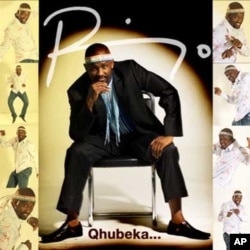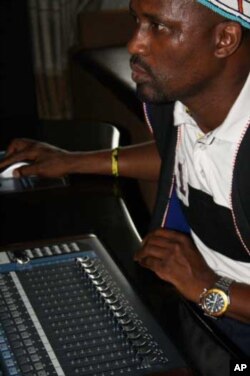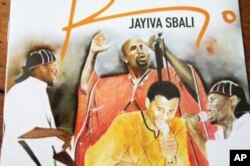“In South Africa, every conceivable situation – be it birth, death, whatever – demands music,” says Ringo Madlingozi, his face fixed upon the multicolored screen of a computer that holds his latest songs. As he speaks, a new recording plays in the background. He nods his head appreciatively, in sync with the beat.
Inside his dark studio in a house in a Johannesburg suburb, Madlingozi – an outstanding vocalist, multi-instrumentalist and session musician – is hard at work on his new album. “It’s called Umbiyozo, which means ‘celebration.’ This is my album celebrating the highs and the lows of modern-day South Africa,” he says.
Madlingozi has performed with international superstars like Eric Clapton, UB40, Simply Red and Teddy Pendergrass. He’s made music for the worldwide smash hit Hollywood movie, The Lion King. He produced several albums for the deceased South African singer the legendary Miriam Makeba.
However, Madlingozi remains one of the unsung heroes of South Africa’s music scene.
Africa’s best
In contrast with many of his contemporaries, he’s not brash and boastful. Even at awards functions, the well-built man often fades into the background, wearing understated clothes and talking quietly in corners with friends. He never seems to appear in South Africa’s newspapers and gossip magazines.
Madlingozi laughs, “I wouldn’t say I am an angel, but I don’t think I do much in the way of bling and bad behavior to deserve appearing on a back page!”
Yet the accolades that this musician’s accumulated are numerous. Since winning the Shell Road to Fame talent competition with his first band, Peto, in 1986, Madlingozi’s won several South African Music Awards and Kora All African Music Awards, for, among other things, Best Male Vocalist in Africa.
His albums have gone double platinum in South Africa, selling over 200,000 copies. He’s performed all over the world, thrilling audiences at leading global music events such as the New Orleans Jazz Festival.
Madlingozi describes his sound as a “mixture of many genres and rhythms,” including rock ‘n roll, jazz, reggae, mbaqanga and maskandi music.
“Mbaqanga and maskandi are the traditional, indigenous South African sounds. With mbaqanga, it’s all about layers of riffs,” he explains. But essentially, Madlingozi adds, he makes African music, the “main elements” of which are “drum, bass and voice.”
Ringo from The Beatles….
On his albums, Madlingozi sings and plays most instruments himself. He’s proficient in guitar, piano, flute and many other instruments. He’s constantly expanding his repertoire. At the moment, he’s teaching himself to play saxophone.
But it’s to the drums that he owes his establishment in South Africa’s music industry, as well as his stage name. Madlingozi explains, “I used to drum when I was young. In fact, I used to bash out rhythms on anything I could get my hands on; that’s what my mother tells me. And when I was a kid, The Beatles were real big. So people started calling me ‘Ringo’ after Beatles’ drummer, Ringo Starr.”
But to this day, Madlingozi hasn’t had “even one second” of formal musical training. “I make music using my ears and heart, through passion and perseverance. Through experience I have learned that if I do something over and over again, it becomes part of me,” he says. “I am entirely self-taught.”
He’s convinced the roots of this desire that drives him presently are to be found in his past. “Because there weren’t many opportunities for black musicians during apartheid, I was forced to teach myself and to work much harder to progress – which in the end has proved to be a good thing!”
Mistakes become sonic success.
Madlingozi prides himself on his powers of improvisation, insisting that he often turns his musical mistakes into sonic successes. “Some of the mistakes are beautiful stuff!” he exclaims.
He bemoans the fact that some record producers “want everything polished and perfect. They tell me, ‘No, Ringo, that note – it’s false.’ Then I tell them, ‘No, it’s meant to be there. It sounds good! Leave it in!’”
Madlingozi attributes his success to “enjoyment. Every single aspect of music that I learn, I enjoy – even the difficult and tedious parts.”
Over the years, he’s honed his live performances to the point where South African music critics have described them as one of the best ever seen in his home country.
“I always want to do better. But the main thing is – I love being on stage,” he says. “I am my own competition. I always put myself in the audience and ask myself, ‘Would I want to see this guy do this and do that?’”
Madlingozi adds, “Sometimes when I’m performing I pick up that I’ve lost some people. Then immediately I strive to connect back with those guys. In so doing, I become more and more dynamic and then the people usually go crazy, man!”
Fighting modern-day evils
Ever since his public debut more than 20 years ago, Madlingozi’s garnered a reputation as a “serious” musician. He says it has a lot to do with his background. Born in 1964, he grew up in Cape Town’s Gugulethu township, which in the past was a key battleground between apartheid security forces and militant black youths. As a young man, Madlingozi witnessed intense violence. Desperate for an escape route, he retreated into music.
“Music was my sanctuary…. My savior, my guide…. I became myself when I was within my music. I became protected, within my music,” he says. “I could say what I liked, how I liked, through my music. I felt I had a voice, through the songs that I made then,” he says.
In present-day South Africa, Madlingozi’s voice remains relevant. “I write about the different people of South Africa accepting one another. I write about the injustices one person forces on others,” he says.
Madlingozi maintains that “just because South Africa is now controlled by a black party (the African National Congress), it doesn’t mean everything’s cool” here at the moment.
He explains, “Today in South Africa, oppression takes many forms; it’s not just racial oppression happening. There are people of all races now in South Africa who just want to put money into their pockets and the poor be damned!”
Madlingozi says he’ll “make music against these evil forces” until they’re vanquished.
“It can take 10 years; it can take 15, 20, but who cares? We will get all those who are not doing the right things, and sing about them, and make noise! Beautiful things, bad things, everything that is happening – people should know what’s happening.”
On his latest album, Jayiva Sbali (Dance, Brothers), a song called Siyabhiyoza (We Are Marching), urges South Africans to protest against modern-day injustices in their country. Madlingozi raises his voice against corrupt politicians, crime syndicates and men who abuse women.
“I can’t be ignorant of these things,” he says. “It’s my duty as an artist to reflect life as it is now in South Africa. And unfortunately, that life isn’t always so nice….”
Then, twiddling some knobs on a mixing board, he smiles and says, “But I hope my music is.”









